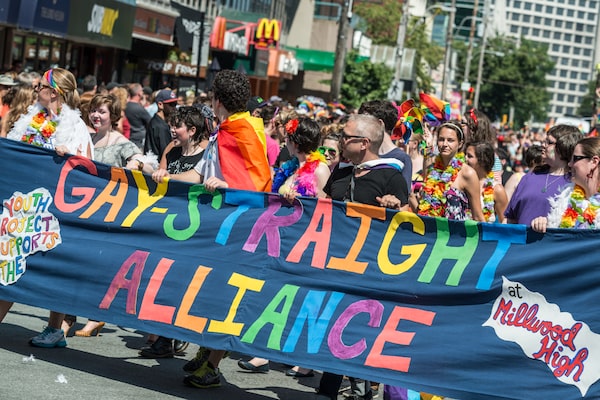
Debate over provincial regulations on gay-straight alliances became contentious in Alberta this summer, forcing some private school administrators to think about protections for students.Shaun Lowe/iStockPhoto / Getty Images
The fate of gay-straight alliances (GSAs) in Alberta became one of the most hotly debated education issues in the province’s recent history this summer.
After a 40-hour debate and overnight filibuster by the opposition NDP, Bill 8 (the Education Amendment Act), put forth by the United Conservative Party, passed. It took effect on Sept. 1.
The bill rolls back parts of the NDP’s Bill 24, which required public-school principals to immediately grant permission for a GSA when a student requests one and prohibited schools from informing parents if their child joins a GSA except in instances when they are under threat of harm, including self-harm. Critics say the changes put the safety and privacy of students joining GSAs at risk.
Alberta’s private-school boards don’t speak with one voice on the GSA issue. Some schools welcomed gay-straight alliances before they became controversial. But last year, a group of mostly faith-based private schools, represented by the Justice Centre for Constitutional Freedoms (JCCF), launched a court challenge on the constitutionality of the NDP version of the GSA legislation, saying the rule against informing parents of students’ belonging in GSAs violates their charter rights.
So what happens in the coming school year?
“No changes are anticipated for students who participate in a private-school GSA,” said Alberta Education spokesperson Carolyn Gregson in an e-mail to The Globe and Mail. Gregson also notes that schools are still required to make their policies public, according to provincial regulations.
“Under the Education Act, private schools must still establish a policy that addresses its obligation to provide students and staff with a welcoming, caring, respectful and safe learning environment that respects diversity and fosters a sense of belonging, that includes the establishment of a code of conduct for students that addresses bullying behaviour,” Gregson says. “The student code of conduct must be made publicly available.”
But many fear the issue of parental notification could have some impact. Teachers or principals are now in a position where they can inform a parent of their child’s participation in a GSA.
Private schools would still be subject to the Personal Information Protection Act, which upholds a student’s right to keep their participation in a GSA private, except in scenarios in which they are at risk of harm, including self-harm.
Amanda Dennis, director of admissions for Delta West Academy in Calgary, says the previous rule prohibiting parental notification was the one detriment to the GSA legislation.
“When the legislation came through that we were no longer allowed to comment on clubs and who’s in what club and what these clubs are actively doing, that part did hurt our school community, because we did notice that parents felt a disconnect to what was happening in the school,” Dennis says.
She adds that Delta West has not had a request from a student to establish a GSA.
Dennis said the school, which serves 80 students, maintains small class sizes and has both students and parents who are openly part of the LGBTQ community.
“They don’t feel they have to hide behind the anonymity of a club because the whole school community is so open,” Dennis says.
“We’ve always promoted diversity and respect and understanding,” she adds.
Other private schools have active GSAs that administrators are now taking steps to protect. Among them is Strathcona-Tweedsmuir School in Okotoks, whose GSA has approximately 30 members each year, out of a student body of 665 (across Kindergarten through Grade 12) this fall term.
The students established a club around 2016, and faculty contribute and support as needed, says Lara Unsworth, director of strategic enrolment management and communications.
“We already have a very active gay-straight alliance at our school, and it is very student-driven,” she says. “Our alumni are quite engaged in that as well.”
“We have alumni from the LGBTQ community come back and talk about their struggles and how hard it was when they were young, where they went for support and why it meant it a lot coming to this school and being loved and accepted no matter what,” Unsworth says.
Unsworth says amid changing legislation and hot public debate, Strathcona-Tweedsmuir has aimed to remain steadfast in its devotion to keeping its students safe.
“As a school, we’re going to protect the students first. We’re not feeling undue pressure because of the change,” she says, in reference to the new provisions on parental notification.
She advises parents and students considering a private school to ask about GSA policies if that’s important to them.
“Make sure you’re on the same page,” Unsworth advises.
Meanwhile, the private schools that were challenging the NDP version of the GSA legislation in court are taking a wait-and-see attitude to the new Education Act, according to Jay Cameron, litigation manager for the JCCF.
Cameron says most of the schools the JCCF represents have policies posted on their websites and are compliant with government policies for the coming school year. Many also have groups and support systems for students – including those in LGBTQ community – in place.
Cameron recommends parents looking for a private school talk to principals and parents of the schools they are considering.